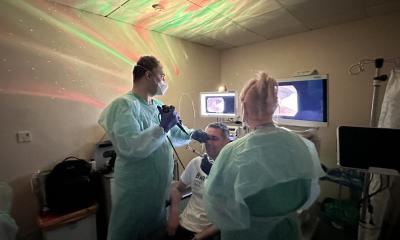News • Longitudinal ageing study
Hearing loss: Many seniors won't tell their doctor
A study has found that nearly 40% of those who recognised they had hearing loss did not inform a doctor or nurse.

Image source: Adobe Stock/Rido
However, this can lead to social isolation, depression, and reduced quality of life, with untreated hearing loss linked to an increased risk of dementia, falls, and other health issues. The new study, which has been published in the International Journal of Audiology, reveals the alarming extent of unaddressed hearing loss among older adults in England, particularly women, retirees, those with foreign education, lower education, smokers, and heavy drinkers – who were less likely to report their experiences.
Conducted by a team of experts led by a researcher from the University of Liverpool, the study used data from the English Longitudinal Study of Ageing (ELSA), a nationally representative database of information on the English population aged 50 and older.
Dr. Dalia Tsimpida, Lecturer in the Department of Public Health, Policy and Systems at the University of Liverpool, who led the study said: “We cannot afford to ignore the impact of hearing loss on individuals and society. We need to raise awareness of the risks associated with hearing loss and take action to prevent, identify as early as possible, and manage it effectively. This includes investing in hearing health research and medical education, as well as policies and public health interventions that promote hearing health.”
A failure to refer patients may result in delayed treatment for those in need and highlights the importance of improving referral pathways between primary and secondary care services to help ensure that patients receive recommended high quality care
Maria Panagioti
However, for those who recognised and reported their hearing loss and were referred for hearing loss management, a significant proportion (78.9%) expressed a willingness to try and use hearing aids.
The findings of the study highlight the need for greater awareness of the importance of addressing hearing loss and access to treatment, particularly for those who may be less likely to report their hearing difficulties. Dr Saima Rajasingam, a Senior Lecturer in Audiology at Anglia Ruskin University and co-author of the study, added: “The high willingness to try hearing aids among those who reported their hearing difficulties highlights the importance of providing access to hearing aids and addressing any potential barriers to their use to improve hearing outcomes for patients.”
The findings of the study also revealed that nearly one-fifth of patients who reported their hearing loss to a primary care healthcare provider were not referred for further hearing assessment in secondary care, as recommended by the Royal College of General Practitioners (RCGP) and the National Institute for Health and Care Excellence (NICE) clinical guidance. Dr Maria Panagioti, co-author of the study and Senior Lecturer at the NIHR School for Primary Care Research at The University of Manchester said: “A failure to refer patients may result in delayed treatment for those in need and highlights the importance of improving referral pathways between primary and secondary care services to help ensure that patients receive recommended high quality care.”
Dr Helen Henshaw, Principal Research Fellow at The National Institute for Health and Care Research (NIHR) Nottingham Biomedical Research Centre at the University of Nottingham concluded: “The study’s findings suggest that there is a need to develop interventions aimed at improving both the acknowledgement and reporting of hearing loss by individuals and primary healthcare providers. By addressing preventable barriers to accessing hearing healthcare, we can improve patient outcomes and help reduce the burden of untreated hearing loss.”
On World Hearing Day 2023, the World Health Organization launched a new primary ear and hearing care training manual. Here they highlight the importance of prioritising hearing health as a public health issue and integrating ear and hearing care within primary care, as an essential component of universal health coverage.
Source: University of Liverpool
01.04.2023





